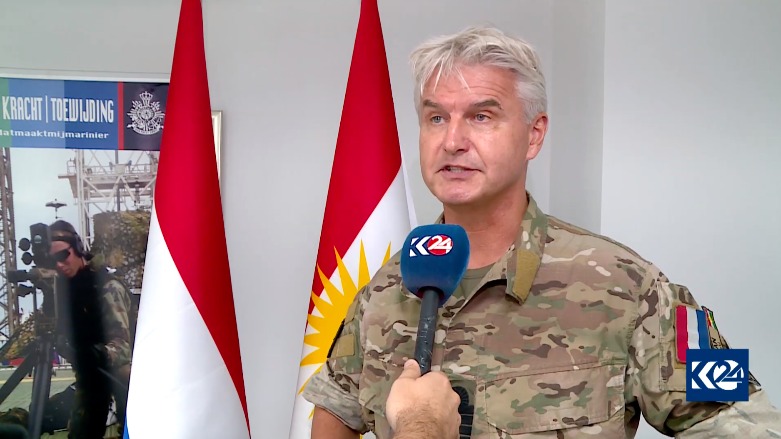Dutch colonel advocates for Peshmerga reform as he departs Kurdistan Region

ERBIL (Kurdistan 24) – As Col. Jan ten Hove prepares to end his tenure as Military Advisor for the Dutch Consulate in Erbil, he told Kurdistan 24 people in the Kurdistan Region are “absolutely the best in the world” regarding hospitality, promised to visit again in the future as a “tourist and a friend,” and used his departing words to push for an ongoing program to reform the command of Peshmerga forces.
“The Kurdish people are so respectful; I think that's something I can learn,” he said. “I think that’s something I will take with me and I will teach, hopefully, to my daughters as well.”
He made sure to drive the point home that he was impressed with Kurdish hospitality, remarking, “They are absolutely the best in the world. You can never find a place where people are so hospitable. This is something really unique: friendship and hospitality.”
Col. ten Hove has an extensive history in the Kurdistan Region. Some 30 years ago, during Operation Provide Comfort, he served as part of a Dutch marines infantry unit that was deployed to the northern city of Zakho to protect the Kurdish population from Saddam Hussein’s Baath regime during the US-led military operation that followed the ceasefire to the 1991 Gulf War.
Although the US intended Provide Comfort to be a limited, humanitarian operation, it eventually led to the creation of the autonomous Kurdistan Region of Iraq as it is today.
As a result of his experiences in the region, he says, ten Hove has been able to witness various forms of progress Kurds have made since 1991.
For the final year in his capacity as security advisor, however, he has largely focused on supporting efforts to reform the region’s Peshmerga forces so they follow a unified command that has little to do with party affiliation. The Netherlands, the US, the UK, and Germany form the unique Multi-National Advisory Group (MNAG) that enthusiastically supports the project to remove local politics from the security equation.
As part of those efforts, Kurdish leaders decided this year to put heavy support units of the KDP’s 80th Unit and the PUK’s Unit 70 under the command of the Ministry of Peshmerga (MOP).
“We see that the First and Second Command of the 70s and 80s are moved under the Ministry of Peshmerga, but also the 80s and the first brigade of the 70s are now also moving under MOP. So this is good news, but they are still small steps because we need to reorganize the Ministry,” he said.
He added that such a change is invariably a ‘slow process’ if a truly modern and unified Peshmerga force is the end result, saying, “I am optimistic that we made some steps and my successor will continue and my predecessors who worked on this process since 2019.”
“It's a vision in one sentence: one effective modern respected Peshmerga force in 2025,” he added. “There's a strategic document that has been signed (by the Kurdistan Regional Government) and we're now pushing for an operating concept that will describe the structure and the force size.”
“Hopefully, we can succeed and realize this vision in 2025,” said the colonel.
Read More: UN envoy urges Kurdistan Region to move ahead with Peshmerga unification
He continued, stating that it has been difficult to overcome issues of trust between the leading Kurdish parties, the Kurdistan Democratic Party (KDP) and the Patriotic Union of Kurdistan (PUK).
He brought up the fact that Kurdish factions fought each other in Iraq in a civil war in the 1990s, adding, “When trust is broken, it takes a long time to build trust.”
Ten Hove says he promised those he has become familiar with in Erbil that he will be back to the Kurdistan Region next year with his wife “as a tourist and a friend.”
Upon departing Erbil, he will return to the Netherlands to his former job in the Dutch Marines Corps and will later go to Naples, Italy to assume a position in NATO’s Joint Force Command that is also overseeing the NATO mission in Iraq.
He added that NATO is increasing its mission in Iraq and “will maybe also expand to the Kurdistan Region,” which it currently does not cover.
“I like to thank everybody, and especially of course the colleagues that I have known now in the Ministry of Peshmerga, for hospitality and their friendship and their trust in me,” he concluded. “And I really felt so welcome and I will definitely come back with my wife in the spring next year.”